‘The Young Karl Marx’—Great Man, Great Acting, Adequate Movie
Filmmaker Raoul Peck struggles to find tension in his look at the communist founder’s salad days.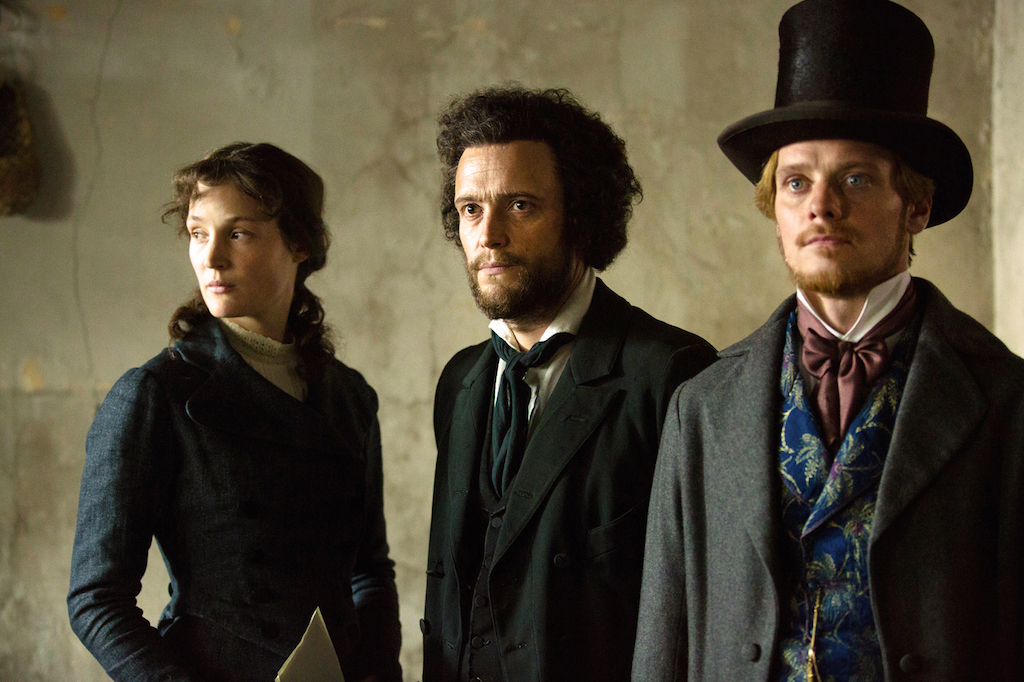 A scene from "The Young Karl Marx." (The Orchard)
A scene from "The Young Karl Marx." (The Orchard)
Those familiar with the movies of Raoul Peck know he has a soft spot for revolutionaries. His portrait of anti-colonial Pan-Africanist President Patrice Lumumba of the Congo premiered to handsome reviews at Cannes in 2000, and last year his documentary “I Am Not Your Negro,” about James Baldwin, received an Oscar nomination. With his latest, “The Young Karl Marx,” he takes on the granddaddy of rebels with mixed results.
While Marx’s writing emphasized a call to action, the movie about his early years is relatively free of the stuff. As expected, exploits are limited to reading, writing and arguing about theory, hardly the most cinematic of material but freighted with enough drama to sustain.
When we first meet Marx (August Diehl), he is an arrogant youth of 25, arguing with editors at Rheinische Zeitung, a newspaper in Cologne, Germany. Downstairs, armed guards have gathered to shut the paper down on orders of the Prussian government at the behest of Tsar Nicholas I, following the publication of an unfavorable article.
Action jumps to Manchester, England, and the Ermen & Engels cotton mill, where worker discontent is roiling. After watching his father dress down laborers, rich kid Friedrich Engels (Stefan Konarske) ventures into the slums to document appalling living conditions. His resulting work awakens in Marx the notion of the poor as a catalyst for revolution.
When the two finally meet in Paris, Marx and Engels get blisteringly drunk and are chased by the cops in a contrived, poorly shot and edited sequence meant to provide a respite from the movie’s ubiquitous theorizing in dimly lit enclaves. It’s a throwaway scene that emphasizes the director’s shortcomings. Peck is a cerebral filmmaker given more to intellectual ideas than to the mechanics of shot selection and editing.
And yet Pascal Bonitzer’s screenplay soldiers on to more conversations in dim salons and bars, illustrating the simple fact that although he led a dramatic life, Marx is a poor subject for a film. The third of nine children from a prosperous family in Trier, Germany, he married aristocrat Jenny von Westphalen, who spurned well-heeled suitors in order to live in itinerant poverty with him, hounded by authorities. “A man without money is nothing,” he bitterly observes. “Money creates worth.”
As structured by Bonitzer, the material is compelling but episodic, with no overarching dramatic objective. Yes, revolution is in the air, but such epic episodes occur beyond the period covered and are outside the reach of Peck’s limited production budget.
Instead, the filmmakers hang tension on Marx’s disagreement with social theorist Wilhelm Weitling, whose 1842 work “Guarantees of Harmony and Freedom” Marx praised, although—as the movie has it—he lamented the lack of a call to action. “Until now philosophy has interpreted the world,” he tells Engels. “But it must be transformative.”
Further tension is mined in Marx’s disagreements with original anarchist Pierre-Joseph Proudhon (played by frequent Dardenne brothers collaborator Olivier Gourmet), whose 1847 work “The Philosophy of Poverty” was rebuked by Marx in his “The Poverty of Philosophy.”
For expediency’s sake, the filmmakers conflate the League of the Just, a utopian socialist secret society, with the British Chartists, named for The People’s Charter of 1838, which expanded democratic rights for workers and artisans. In reality, Marx became associated with the league in Paris and later Brussels while writing for Vorwärts, a newspaper (published by the Social Democratic Party of Germany) that was affiliated with the group.
In an improbable scene, Marx and Engels lobby to be heard at a meeting of the league, then stage a coup, reshaping it into the Communist League. In reality, Marx spent months lobbying members to come out of secrecy and appeal directly to the working classes in June 1847. But the facts are not conducive to concise storytelling, which explains the movie’s contrived third-act rush to publish “Manifesto of the Communist Party” as a basis for the newborn party just months before the revolutions that swept Europe in 1848.
For a movie about a philosopher and the concept of historical materialism as a means of social revolution, “The Young Karl Marx” is not the long, hard slog one might expect. Instead, it is a long, soft slog, offering a memorable performance by Diehl as the young philosopher. Familiar to audiences as Major Hellstrom in Quentin Tarantino’s “Inglourious Basterds,” Diehl brings humanity to a role that lacks inner life and emotional resonance.
Such shortcomings in Bonitzer’s screenplay may be attributable to the fact that the movie is less about the man than the message. Crusty and obstreperous though Marx is, it’s hard to find too much fault with him. Lacking inner conflict, his struggle with the outer world is a simplistic duel between good and evil.
Konarske plays a dandyish Engels whose good manners make him the yin to Marx’s yang, which is the epitome of intellectual brute force. Making the most of her limited screen time is Hannah Steele, who delivers a spirited performance as Engel’s wife, Mary Burns. As Jenny Marx, a progressive woman of class and distinction who favors intellectual rigor over aristocratic trappings, Vicky Krieps nearly steals every scene she’s in. Currently starring in the Oscar-nominated “Phantom Thread,” Krieps has an ethereal beauty and a responsive delivery, which, as with her cast-mates, enable her to emotionally flesh out what’s lacking in Bonitzer’s screenplay.
The elevated work of the cast is attributable to fine acting, but also to Peck’s direction as he sidesteps some of the material’s flaws, though his efforts to humanize his subject often fall flat (do we really want to see Karl Marx having sex?). Cinematographer Kolja Brandt’s chiaroscuro lighting and Benoît Barouh’s no-frills production design bring dour life to European ghettos and side streets.
Lest audiences come away believing Marx and his ideas are relics consigned to college courses and nostalgic baby boomers, Peck connects his subject to today by rolling final credits with documentary footage of 20th-century flashpoints and figures—the Berlin Wall, Che Guevara, the Occupy movement, Nelson Mandela—while Bob Dylan sings “Like A Rolling Stone.”
If millennials are bringing Marxist notions back into style, then “The Young Karl Marx” might be perfectly timed, though fat chance you’ll find teens and college kids flocking to see it at the multiplex instead of, say, “Black Panther.” Even so, without Marx and the revolutionary notions that inspired its namesake, there wouldn’t be a “Black Panther.”
Independent journalism is under threat and overshadowed by heavily funded mainstream media.
You can help level the playing field. Become a member.
Your tax-deductible contribution keeps us digging beneath the headlines to give you thought-provoking, investigative reporting and analysis that unearths what's really happening- without compromise.
Give today to support our courageous, independent journalists.

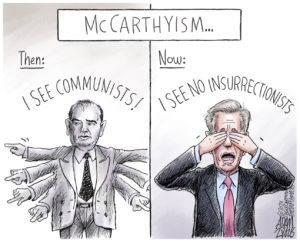

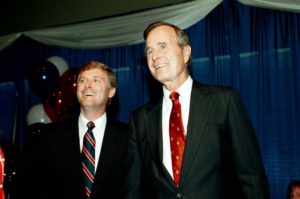
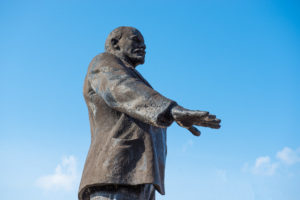
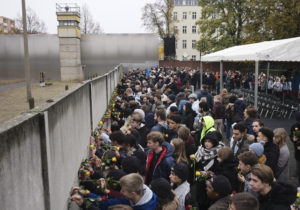
You need to be a supporter to comment.
There are currently no responses to this article.
Be the first to respond.